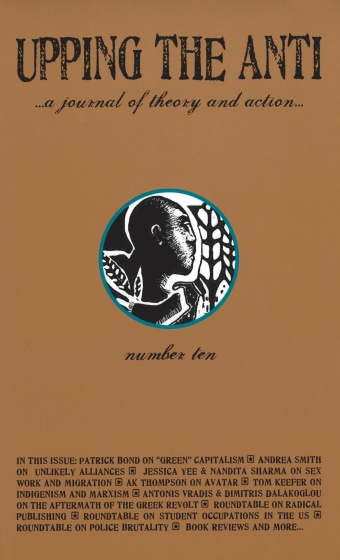On Dialogue and Freedom of Speech
Dear UTA,
Israel advocacy organizations and the Harper government are together mounting an unprecedented silencing campaign aimed at shutting down Palestine solidarity in the Canadian state. Ben Saifer’s important article in the last issue of Upping the Anti showed that this silencing campaign takes many forms, including calls for dialogue. It is important to understand the logic of this silencing campaign as we fight for free expression and solidarity with Palestine.
The silencing campaign has included attempts to stifle Israeli Apartheid Week (IAW), the defunding of non-governmental organizations such as Kairos and the Canadian Arab Federation, the exclusion of British MP George Galloway from Canada, political interference to gut the Rights and Democracy organization, and attempts to redefine criticism of the Israeli state as “anti-semitism” through the Canadian Parliamentary Coalition to Combat Anti-Semitism (CPCCA).
The Members of Ontario’s Legislature who were present on February 25, 2010 voted unanimously to support a private members’ motion condemning IAW. NDP leader Andrea Horwath, who was not in the Legislature at the time, later released a statement that was critical of the motion. This motion is entirely symbolic, but it is already being used to propel the silencing campaign. It was, for example, cited as part of the justification for the Toronto District School Board’s motion to ban IAW events from Toronto schools. A similar motion in the Federal Parliament did not obtain unanimous consent, in large part because of the principled stand of Libby Davies, a NDP Member of Parliament.
The silencing campaign has, in short, found support from powerful people. Nevertheless, it has not shut down IAW, which has in fact continued to grow globally. We need to understand the silencing campaign is a response to the growth of the Palestine Solidarity movement in Canada, driven both by the increasing effectiveness of the campaign for Boycott, Divestment and Sanctions (BDS), and by the brutal record of the Israeli state, most recently in the assault on Gaza (December 2008-January 2009).
The BDS campaign, launched in Palestine in 2005 and endorsed by a wide range of civil society organizations covering the breadth of Palestinian society, provides activists with a framework for effective solidarity action connected to a global network. The Israeli assault on Gaza caused many to ask questions about the character of the occupation and the history that has put Palestinians in their current position.
The silencing campaign has sought to restrict the expression of Palestine solidarity by shutting down events (such as IAW), delegitimizing protest by labelling any criticism of Israel outside of very narrow bounds as “the new anti-semitism” and by characterizing activist responses as exceptional, irrational, and indeed dangerous. This silencing campaign frames rational and civil dialogue as the alternative to disruptive and divisive protest.
Of course, advocates of free expression favour dialogue and the exchange of ideas at all levels, which necessarily includes attending to views that are not your own and presenting ideas effectively to others who might not agree. However, dialogue does not replace mobilization for social change and is often used to mask fundamental inequalities between those engaged in verbal exchange. Dialogue will not change relations of domination grounded in coercion.
The way dialogue around Palestine/Israel is being framed is particularly problematic. As Saifer shows, this dialogue is often organized as an interchange between Muslims and Jews, as if the situation in Palestine/Israel and the global solidarity movement result from some great gulf between members of these cultural and religious groups. The tensions that arise on campuses around IAW are not the result of cultural misunderstanding between Muslims and Jews. In fact, the major source of tension that we have witnessed results from deliberate attempts to intimidate Palestine solidarity activists and shut down events.
Saifer’s timely analysis provides a valuable lens for identifying and responding effectively to new dialogue initiatives. The CPCCA process seems to be providing university administrators with a new orientation toward dialogue initiatives. It is instructive to examine statements by academic administrators presented at the CPCCA “inquiry” in November 2009 and January 2010 (www.CPCCA.ca). Those who presented statements were uniformly careful to state that anti-semitism was not a widespread or generalized problem on campuses. At the same time, “dialogue” was a common theme in their presentations.
Former Trent University President Bonnie Patterson, for example, presented to the CPCCA in her current capacity as President and CEO of the Council of Ontario Universities. Her statement to the CPCCA lauded the “network of best practices” for “mutual respect and dialogue” that currently exist or are being created across campuses. Amongst the models she praised were the McMaster Peace Initiative and practices at Carleton University.
Ben Saifer examined both of these cases in his article. At both McMaster and Carleton, dialogue initiatives coincided with instances of administrative repression of free speech for Palestine solidarity organizing. In 2008, McMaster University proposed a ban on the use of the term “Israeli Apartheid,” while Carleton’s administration banned the IAW poster in 2009. Dialogue and silencing have often served as partners in the narrowing of discussion, debate, and activism around Palestine. Saifer has made an important contribution to the movement in analyzing these trends.
We need this kind of insightful and lively analysis as we organize to combat the silencing campaign and to win support for boycott, divestment, and sanctions. Our experience with Faculty for Palestine convinces us that Palestine solidarity organizing is reaching a new level on our campuses and in our communities. The divestment campaign at Carleton University is an important example of this, as is the work going on in the Canadian Union of Postal Workers to build on the pro-BDS motion the union approved. There is an enormous need for us to develop our political analysis as we negotiate the campaign through its next phases. Let’s find ways to keep this conversation going.
In solidarity,
Alan Sears and Mary-Jo Nadeau
Toronto

